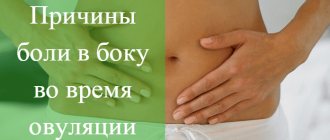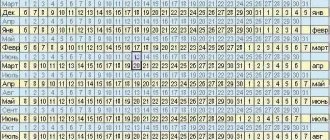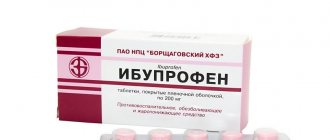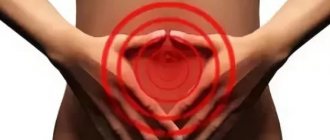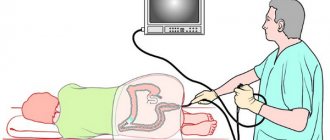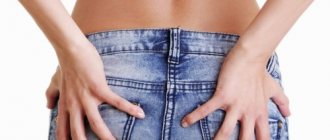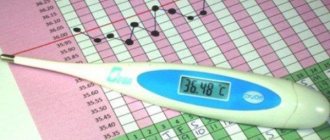How many days before your period does your stomach start to hurt?
Premenstrual syndrome manifests itself as a result of disruption of the endocrine and central nervous systems. As a result, the metabolism does not function as usual, and the woman experiences various ailments:
- headache;
- nausea;
- bloating;
- depression or aggressive behavior.
Often before menstruation, the breasts become enlarged and painful, shortness of breath or problems with the heart appear. These symptoms usually appear a week before your expected period. An earlier feeling of discomfort is possible - immediately after ovulation, which occurs in the middle of the cycle. If a woman's cycle lasts 28 days, then ovulation occurs on the 14th day. At this moment, the walls of the follicle rupture, and the egg, ready for fertilization, comes out of it. During this period, a woman may experience pain in the lower abdomen.
Approximately 10% of girls of childbearing age experience very strong pain, and not only the stomach hurts, but also the lower back, stomach, head, and legs.
If a week before your period your lower abdomen feels tight, but the pain is insignificant and appears every time at the same time with the same intensity, this may be due to functional disorders and characteristics of the body. Such symptoms do not require treatment.
What causes chest and stomach pain before menstruation?
You may have already read or heard about premenstrual syndrome. Engorgement of the mammary glands, nagging pain in the lower abdomen, increased irritability and tearfulness - all these are symptoms of that same PMS. As a rule, they appear due to changes in the balance of hormones in your body in the second half of the menstrual cycle. If your chest and abdomen begin to hurt a lot long before your period (2 weeks or more), the cause may be inflammation or other health problems.
Causes of pain in the lower abdomen before menstruation
There are several reasons why pain in the lower abdomen appears before menstruation. These are features of the endocrine system, in particular the balance of estrogen and progesterone. In turn, they stimulate the production of endorphins - natural hormones of joy, which in their chemical composition are opiates. When progesterone levels decrease after ovulation, the body does not produce endorphins. Along with a decrease in progesterone, a woman may have a lack of estrogen, so negative symptoms increase.
Natural causes that require correction also include:
- poor diet and lack of microelements - potassium and magnesium;
- constant stressful situations in life;
- lack of sleep.
The moment when painful sensations began to bother the woman will help determine the cause. It is enough to remember after what events the pain became especially severe. Next, you will need to establish a daily routine and nutrition. It should be remembered that the body, which is under constant stressful conditions, consumes more calories, vitamins and minerals. If the diet is not adjusted in time, he may react with illness.
Congenital anomalies of the uterus as a cause of premenstrual pain
Congenital defects of the reproductive system include bicornuate, saddle-shaped, double and underdeveloped uterus.
When an organ is duplicated, one is usually normal, the other rudimentary. Pregnancy occurs in a normal organ. There are cases when both uteruses develop normally. This can be determined using ultrasound. Both menstruate at the same time, but poor blood flow from the rudiment causes tissue stretching and pain.
This is a dangerous condition, since pregnancy in the horn of the rudiment is considered ectopic and can cause tissue rupture. Doctors recommend removing it. The risk of miscarriage is also higher than in women with a normal structure, so the pregnant woman is monitored from the first days after conception.
Hypoplasia is a congenital “damage” in the body that leads to the absence of menstruation in an adult girl. Sometimes this can cause irregular menstruation with long breaks. If, together with the underdevelopment of the uterus, there is an underdeveloped vagina, a tumor neoplasm - hematocolpos - may appear in the lower abdomen. As it increases, it occupies the entire pelvic area. The reason is the impossibility of outflow of menstrual blood. Hematocolpos is removed surgically, as it causes severe arching pain and can cause sepsis.
With congenital aplasia - the absence of the uterus and vagina, or only the uterus - girls have no menstruation against the background of normally formed secondary sexual characteristics. At the same time, every month they feel pain in the lower abdomen, their breasts become rougher, their mood changes, because the ovaries are well developed and secrete sex hormones.
Inflammatory processes of the reproductive organs
With inflammatory processes in the pelvic organs, the state of health before menstruation can sharply worsen. This is due to changes in blood inflow and outflow, vascular obstruction. If menstruation has always been normal or with minimal deviations, with inflammation the pain is felt much more strongly.
Inflammation occurs for several reasons:
- infection;
- lack of sexual satisfaction;
- abortion;
- penetration of infection into the abdominal cavity from the uterus and the development of pelvioperitonitis.
Possible penetration of microbes from the intestines or appendix. In this case, surgical intervention and disinfection of internal organs are required.
Inflammatory processes in the ovaries are rare. Most often they begin at the site of a burst follicle. After an abortion, damage to the fallopian tubes is possible, and every fifth woman may subsequently have problems conceiving due to adhesions. Sometimes the process affects the muscle tissue of the uterus, which is accompanied by swelling due to poor microcirculation. Treatment is carried out with antibacterial, anti-inflammatory and restorative drugs.
Benign tumors
Due to hormonal imbalance in the wall of the uterus, nodular compactions - fibroids - sometimes appear. They are distinguished by location - in the muscle layer, outside the uterus, in the cavity, in the cervical canal. The presence of fibroids can be suspected by the following symptoms:
- menstruation becomes heavier and lasts more than a week;
- pelvic pain;
- difficulty urinating or defecating due to compression of the intestines or bladder;
- abdominal enlargement.
Small fibroids can be treated conservatively with the help of hormonal medications. If the tumor quickly increases in size, or there is a combination of endometriosis and fibroids, surgical removal is suggested.
Fibromatous growths on the mucous layer of the uterus occur due to traumatic manipulations - abortion, diagnostic curettage, frequent childbirth. A characteristic sign of fibroids is severe pain during menstruation and heavy bleeding. Treatment is carried out using conservative or surgical methods, depending on how the patient feels.
If the tumor interferes with normal sex life or requires constant use of strong painkillers, it is better to remove it. A complication of fibroids can be miscarriage or infertility.
Infections
With irregular sex life and frequent changes of partners, if hygiene rules are not followed, infection may enter the vagina, and from there into the uterus and tubes. This causes local inflammation and swelling. Before menstruation, the pain intensifies. The inflammatory process involves the organs of the urinary system and the lower intestines.
Alarming symptoms
The following symptoms should not be ignored:
- Heavy bleeding during menstruation. This may indicate the presence of tumors, including malignant ones, endometriosis, and bleeding polyps. As a result of regular blood loss, anemia can develop, and this is a problem for the whole body.
- Nagging pain in the lower abdomen before menstruation can be a sign of an ectopic pregnancy if there was unprotected intercourse during ovulation, or the woman is planning a pregnancy. It is necessary to do an hCG test or verify the presence of an embryo using ultrasound. The device will show whether the zygote is located correctly or whether surgical intervention is required.
- After an abortion, problems with menstruation may occur. If artificial termination of pregnancy is carried out in unsanitary conditions, it causes infection of the peritoneum, which leads to its inflammation. In this case, it is necessary to carry out abdominal surgery and a number of measures to relieve symptoms of intoxication. At the first signs you should consult a doctor.
- Even at a young age, cases of cervical cancer occur. One of the first symptoms is pain after sexual intercourse and spotting. If this happens, you need to be examined by a doctor or donate blood for tumor markers in any specialized laboratory.
Alarming symptoms appear suddenly or grow rapidly. In this case, you should not hesitate to go to the doctor.
When pain is dangerous
Painful sensations in the lower abdomen may indicate early termination of pregnancy or an ectopic pregnancy. Both conditions pose a great danger to women. If you notice the following symptoms, you should immediately consult a gynecologist:
- 1. Constant pain in the lower abdomen. The unpleasant sensation intensifies when a woman begins to bend or turn. A small amount of blood comes from the vagina. Symptoms may indicate an ectopic pregnancy.
- 2. Pulling in the lower abdomen and brown discharge. This condition may indicate that a woman is pregnant. If the test is positive, it is necessary to urgently call an ambulance, since these symptoms may indicate an interruption.
How to help yourself with PMS
Women most often use medications to treat premenstrual syndrome. For severe pain, they take potent drugs, which has a bad effect on the functions of the liver and kidneys.
It is worth trying to regularly use the knowledge of traditional medicine based on taking herbs and infusions. Some of them contain substances similar to estrogen, so they are able to normalize hormonal levels before and after menstruation.
Herbs that are recommended for use by women and girls:
- Nettle - contains a set of useful substances - vitamins, hemostatic substances. Has an anti-inflammatory effect, relieves menstrual pain. It is recommended to drink from the middle of the cycle until the end of menstruation.
- Oregano - used for delayed development of internal genital organs, as well as for pain in the lower abdomen.
Treatment with herbs should be carried out regularly, it is advisable to start the course of treatment before the onset of pain - 1 - 2 weeks before menstruation.
A few days before menstruation, not only the stomach, but also the lumbar and chest areas may hurt. It is considered normal if the pain disappears when your period starts. This effect is called premenstrual syndrome, and many treat it as a sad reality. However, there are more serious reasons why your stomach hurts before your period.
When pain is dangerous
Painful sensations in the lower abdomen may indicate early termination of pregnancy or an ectopic pregnancy. Both conditions pose a great danger to women. If you notice the following symptoms, you should immediately consult a gynecologist:
- 1. Constant pain in the lower abdomen. The unpleasant sensation intensifies when a woman begins to bend or turn. A small amount of blood comes from the vagina. Symptoms may indicate an ectopic pregnancy.
- 2. Pulling in the lower abdomen and brown discharge. This condition may indicate that a woman is pregnant. If the test is positive, it is necessary to urgently call an ambulance, since these symptoms may indicate an interruption.
Causes of abdominal pain before menstruation
There are several reasons for the appearance of nagging pain in the lower abdomen shortly before menstruation. Let's look at the main ones.
Premenstrual syndrome
PMS appears due to a surge of hormones that occurs during the preparation of the female body for menstruation. After all, he needs to tear away the active layers of the uterine mucosa, that is, the endometrium.
If pain appears a maximum of one day before the onset of menstruation and is accompanied for 2 days after the onset, this condition is called dysmenorrhea.
.
In addition to abdominal pain, premenstrual syndrome is sometimes accompanied by accompanying symptoms:
- increased irritability;
- often want to cry;
- fast fatiguability;
- the pain is nagging, but insignificant.
PMS also manifests itself as increased appetite, emotional disturbances, bloating and intestinal problems. Headache, drowsiness, and high blood pressure may occur.
Other causes of abdominal pain
Algomenorrhea
refers to a gynecological disorder in which abdominal pain begins approximately 7-8 days before the onset of menstruation and persists for another week after the onset.
The sensations are not pronounced, there are accompanying symptoms:
- nausea;
- depression;
- headache.
Occurs when there is an intrauterine device or when the uterus is not positioned correctly. It can also appear during inflammatory processes in the pelvic organs and after operations (abortion, etc.).
Quite often, algomenorrhea acts as a symptom of other gynecological pathologies, for example, inflammation of the uterine cavity and appendages, endometritis, and diseases of the genitourinary system.
Adnexitis, inflammation of the appendages and other gynecological pathologies
. In this case, the abdominal pain is sharp, the body temperature rises, the cycle is disrupted, and during sexual intercourse the woman experiences a strong feeling of discomfort. This is caused by hypothermia, infection with bacteria such as chlamydia and gonococcus.
Endometriosis
, that is, excessive growth of the epithelium. Pain manifests itself not only in the abdominal area. My back and legs also hurt. The sensations are increasing in nature, while the discharge of blood is very abundant.
Genitourinary infection
characterized, in addition to abdominal pain, by the following symptoms:
- headache;
- high body temperature;
- burning, itching in the genitals;
- the appearance of an unpleasant odor;
- unusual discharge.
This may be infection with bacteria such as herpes, gonorrhea, mycoplasmosis, trichomoniasis, etc.
Myoma
is also the cause of pain in the abdomen before menstruation. Associated symptoms: excessive bleeding, irregular periods (delays or, conversely, early periods).
In case of spasmodic pain, the cause may be problems with the intestines
. Additionally, the following may appear:
- constipation;
- diarrhea;
- nausea;
- vomit.
Decreased endorphin levels
causes not only pain in the lower abdomen, but also in the chest. This happens due to hormonal imbalance, which is quite natural before menstruation.
Appendicitis
also accompanied by abdominal pain. Additional signs:
- nausea and vomiting;
- diarrhea;
- temperature increase.
The pain can be localized in one place or wander throughout the abdominal area. Read about other causes of abdominal pain here.
Chest pain before menstruation - normal or not?
Even with the correct functioning of the reproductive system, pain often appears before the onset of menstruation. Its localization and intensity depend on the individual characteristics of the body and reactions occurring at the hormonal level. Often women complain of nagging abdominal pain before menstruation. They appear as a result:
- formation of a wound when the egg is rejected from the uterine mucosa;
- fluid retention in the body;
- varicose veins;
- increasing the size of the uterus, squeezing neighboring organs, nerve endings, and disrupting blood flow.
Pain before menstruation a week is sometimes observed in women as a result of hormonal changes. They can have the following localization:
- Head, occipital region, temples. The pain is characterized by pulsation and intensity.
- Mammary gland. The painful syndrome occurs due to swelling, enlargement of the glandular tissue of the breast, a rush of blood, and is bursting in nature.
- Stomach. Shortly before menstruation, contractions of the uterus occur, causing an exacerbation of ulcers and gastritis.
- Joints. Pain syndrome can be caused by an increase in the amount of progesterone or inflammatory processes in the pelvic organs.
- Small of the back. Aching pain occurs when the position of the uterus changes, swelling develops, or muscle tension. It often radiates from the lower abdomen.
The pain syndrome usually manifests itself several days before the critical days, and at the same time a headache may begin to ache and the mood may deteriorate. All this accompanies premenstrual syndrome - which every woman experiences before the start of pregnancy. During PMS, problems manifest themselves throughout the body, including the skin, hair, and psychological state. Moreover, pain during this period is considered a normal process, most often characterized by intestinal dysfunction, pulling sensations, and aching sensation.
Why can breasts swell before menstruation? This reaction is explained by changes in hormonal levels and is associated with reproductive function. The following processes occur in the female body every month: immediately after the end of menstruation, the mechanism for the maturation of a new egg is launched. It then leaves the ovary and travels through the fallopian tube to the uterus.
- irritability, nervousness, increased fatigue and other signs of PMS;
- minor pain in the lower back;
- nagging pain in the lower abdomen;
- The mammary glands swell and there is pain.
All symptoms (except for the last reaction) intensify immediately before the start of bleeding and can continue until it ends. And breast discomfort is noted much earlier: a week before menstruation (or even two). And as they approach, the symptoms subside. This is normal, since three hormones “force” breasts to swell - progesterone, estrogen and prolactin.
Enlargement of the mammary glands, tingling, pain and other unpleasant sensations are a sign of the body preparing for a possible pregnancy. That is why the breasts are the first to react to changes in the balance of hormones - during ovulation. And as the period approaches, the symptoms gradually subside, as the body “understands” that pregnancy has not occurred.
Why do the mammary glands become enlarged? This is a response to changes in the concentrations of progesterone, estrogen and prolactin. Active production of these hormones is observed during ovulation. The female breast has a lobed structure; each lobe contains glandular, connective and adipose tissue. They contain milk ducts. In the first half of the menstrual cycle (the time of growth and maturation of the egg), the amount of estrogen increases, which affects adipose tissue.
- the chest swells and hurts;
- its sensitivity increases;
- the nipples become slightly rougher (they may protrude more clearly, become more sensitive and/or painful, and sometimes a small transparent discharge appears).
Can breasts hurt before menstruation? Yes, this fits into the concept of “physiological norm”, but not always. If a woman has not experienced discomfort for many years, and then the first symptoms appear, then it is worth finding out the reason for such changes. If one breast hurts, but the other does not react at all, then this may also indicate certain problems.
What matters is the strength and duration of the sensations, the presence of discharge and its nature, and the timeliness of the attenuation of symptoms (during menstruation). Do the mammary glands necessarily hurt? No, if they increase slightly, then such a reaction should not occur. Many women may not experience any discomfort at all due to a small monthly breast swelling.
Breast enlargement will be natural if it occurs during the period of ovulation and continues until the onset of menstruation. On average, it is considered normal if the first signs appear within 2 weeks. The average menstrual cycle lasts 28-30 days. Accordingly, ovulation occurs on days 14-15, which is when the likelihood of getting pregnant is maximum, and the uterus and breasts are somewhat modified under the influence of hormones.
It is considered absolutely normal if the mammary glands begin to ache from the moment of ovulation and the discomfort continues until the start of menstruation. During this period, sensitivity increases, sometimes the pain threshold is so high that even a simple touch of underwear to the nipple causes pain.
Discomfort and pain may be:
- localized: for example, touching the mammary glands is painless, and the nipples are hypersensitive;
- spilled: no specific area, any touch is painful;
- radiating: radiates to the back, to the armpit on the side (on one or both sides) and even down the abdomen.
The nature of the pain is:
- static (constant);
- periodic (depending on the impact - touching, pressing, etc.);
- tingling;
- pulling.
You can also distinguish the strength (from minor to unbearable) of pain. If they are minimal, then it is enough to follow “precautionary measures”: when your chest begins to hurt, wear loose underwear, choose a comfortable sleeping position (for example, on your back), choose the right bra (slightly larger in size, made of soft material).
Can we consider such pain to be a pathology? If they are caused by hormonal changes in the body, then they belong to the category of “physiological norm”; the intensity of the sensations may just be an individual reaction. But the pain syndrome may have other causes, pathological. Therefore, it is important to determine why exactly it occurs.
Causes of pain in the lower abdomen:
- Wrong lifestyle;
- Poor nutrition;
- Diseases of a gynecological nature, including abnormal location of the uterus;
- Injuries to the genital organs (abortion, difficult childbirth);
- There is an intrauterine device.
It often happens that there is pain in the abdomen, the whole body aches, there is a feeling that menstruation is about to begin, but it is not. The reasons for this behavior of the body can be varied.
Reasons for delay:
- Hormonal imbalance in the body;
- Pregnancy;
- Inflammatory processes in the genital organs;
- Ovarian diseases;
- Cycle disruption.
The reasons why bloating may occur a few days before your period, as well as pain in the lower abdomen, are different. One of them is poor intestinal motility, which occurs due to changes in the blood supply as the body prepares for the upcoming menstruation. Increased blood flow affects not only the genitals, but also the intestines, causing increased gas formation. Bloating can occur due to the growth of the endometrium in the uterus, which becomes thicker, causing the abdominal muscles to react.
When do you need to see a doctor urgently?
If you are accompanied by constant and severe abdominal pain, you are uncomfortable in any position, you cannot stand, lie, or sit - contact your gynecologist immediately! You may be developing one of the above pathologies. And such signs may indicate an ectopic pregnancy.
You should definitely visit a doctor if the pain does not go away on its own. To get rid of it you have to take strong painkillers. If you do not pay attention to such symptoms, this can lead to the development of serious pathological abnormalities, including infertility and death.
What if your stomach hurts before your period, but you don’t have it?
It also happens that there is pain in the lower abdomen, but menstruation does not occur. At the same time, the pain is nagging in nature; it is no different from the sensations that accompany a woman every month. And the reasons may be the following:
- Ovulatory pain syndrome
is one of the most harmless causes. Appears 10-15 days before the expected time of menstruation. Localized mainly on one side of the abdomen. This is due to the location of the egg. Why does pain occur during ovulation? It turns out that during this period the follicle ruptures, resulting in minor bleeding that irritates the abdominal wall. This is not at all dangerous, as it is a feature of the female body. - Pregnancy
. During pregnancy in the first trimester, the tone in a woman's uterus increases. This is an unusual condition, so this process is manifested by pain, as during menstruation. In this case, you need to immediately contact a gynecologist, as this may indicate spontaneous abortion or ectopic pregnancy. In the second case, the pain radiates to the rectum. The woman feels sick, vomits, becomes dizzy, and even loses consciousness. You need to be very careful, as internal bleeding may occur. - Acyclic pain continues for a long time, but without cramps and the onset of menstruation. They occur against the background of varicose veins
in the pelvic organs, with congestion, adhesions and endometriosis. Other causes of acyclic pain syndrome: osteoarthritis, urolithiasis, cystitis, uterine fibroids, etc.
Why does my stomach hurt but I don't have my period?
Many women are interested in why the lower abdomen feels tight and painful 10–14 days before menstruation, but when the time comes, it does not begin? There may be several reasons for this:
- disruption of the menstrual cycle;
- disruption of ovarian function;
- inflammatory processes;
- pregnancy;
- neoplasm in the uterus;
- ovulation;
- incompletely removed fertilized egg after abortion.
If the pregnancy test is positive, but the lower abdomen continues to hurt, this may mean that the uterus is in good shape. The doctor will prescribe a drug that will correct the situation. Ovulatory pain is a distinctive feature of a woman’s body and does not pose a threat.
But a poorly performed abortion, as a result of which the fertilized egg was not completely removed, can cause infection. Pain caused by this reason may be accompanied by fever, weakness, and nausea. This condition requires surgery.
If there is a tumor in the uterus, the stomach feels tight before menstruation for 10–14 days. In some cases, the pain may go away on its own, without taking painkillers. If your period does not come, you need to consult a doctor who will adjust the treatment.
Treatment: how to remove spasms
To find out the cause of the pain, you need to contact a gynecologist who will prescribe an ultrasound examination of the pelvic organs. And, if necessary, other internal organs. Be sure to undergo general urine and blood tests. In some cases, other hardware diagnostic methods may be prescribed:
- CT;
- MRI;
- laparoscopy;
- hysteroscopy, etc.
Treatment is always determined after a thorough examination and identification of the causes of pain before menstruation. Therapy is prescribed depending on the etiology, characteristics of the disease and the woman’s body. If the cause is an inflammatory process in the uterus, then appropriate treatment is prescribed.
Antispasmodics
If abdominal pain is antispasmodic in nature, it is necessary to take appropriate medications. After all, spasms always occur against the background of contractions of the muscular system. In our case, this happens in the uterus. Antispasmodics can be bought without a prescription, but it is not advisable to exceed the dosage indicated in the instructions. The most effective painkillers and antispasmodics:
- "Papaverine" in the form of tablets and rectal suppositories. Contraindications: liver failure, heart problems, glaucoma.
- “No-shpa” is based on drotaverine and is available in tablet form. Contraindications: lactation, lactose intolerance, heart disease, kidney disease, liver disease. Analogs: “Unispaz”, “Spakovin”.
- "Halidor" consists of bencyclane and has an additional property - sedative.
- "Buscopan" has the active substance hyoscine butyl bromide. It is produced in tablet form and in the form of rectal suppositories.
Nonsteroidal anti-inflammatory drugs (NSAIDs)
Nonsteroids, that is, non-hormonal drugs, quickly eliminate pain and neutralize the inflammatory process. It is strictly forbidden to take without prior consultation with a doctor.
- Regular Paracetamol in the form of tablets, suppositories, suspensions. Contraindications: kidney and liver diseases, alcohol intoxication. It also has analogues: “Acetaminophen”, “Lupocet”, “Panadol”, “Febricet”, etc.
- "Ibuprofen": tablets, rectal suppositories, capsules, suspension. Contraindications: asthma, ulcerative manifestations in the gastrointestinal tract, kidney and liver pathologies. Analogs: “Ibuklin”, “Brustan”, “Khairumat”, “Next”, “Sedalgin”, etc.
- "Diclofenac" in the form of suppositories, tablets and capsules. Contraindications: ulcers and inflammation of the gastrointestinal tract, asthma. Similar drugs: “Naklofen”, “Voltaren”, “Rapten”, “Diclovit”, “Sanfinak”, “Revmavek”.
- Naproxen tablets can be taken no more than twice a day. Contraindications: ulcers, lactation, ac, Naproxena, Nalgesin, Apronax.
- Tablets and capsules "Ketoprofen". Contraindications: gastrointestinal ulcers, hemophilia, liver and kidney diseases. Analogs: “Flamax”, “Ketonal”, “Dexalgin”.
Alternative Methods
You can try to relieve abdominal pain before menstruation without medication. Of course, if it is not associated with a serious illness. There are the following alternative methods for relieving pain:
- Exercise tightens the muscular system of the pelvic organs. Therefore, frequent exercise, and especially during PMS, helps prevent pain.
- A warm heating pad on your stomach or back will help relieve pain.
- Massage in the lumbar region, back, abdomen and legs.
- Give your body proper rest, sleep more.
- Take plenty of vitamins just before your period starts.
- Take a hot bath, relax. You can add essential oils and herbal decoctions to the water.
- If you are experiencing pain, do not use sanitary tampons, give preference to pads.
- Try acupuncture. To do this, you need to visit a certified specialist. By applying the finest needles to certain points, you can get rid of abdominal pain before your period.
You can relieve abdominal pain before menstruation with the help of simple gymnastics. The video presents a set of exercises that will help get rid of pain:
Folk remedies
The most popular and effective recipes for abdominal pain before menstruation:
- Herbal decoction: shepherd's purse, knotweed, mistletoe, valerian root. Take all components in equal proportions. For 1 glass of boiling water, 1 tablespoon of the mixture is enough. Drink 200 ml twice a day.
- Take cinquefoil root, yarrow, and shepherd's purse in equal proportions (25 grams each). Add oak bark (10 g). Pour boiling water (200 ml). Drink twice a day.
- Tincture. In a ratio of 1:2:1, take the root part of valerian, chamomile flowers and mint leaves. Brew and leave for half an hour. Take 2 tbsp three times a day. spoons, always after meals.
- Buy calendula tincture at the pharmacy, mix it with water according to the recipe indicated in the instructions. Use for douching.
- Wild strawberry in the form of dry leaves. For 1 tbsp. l. take 400 ml of water. Leave for 7-8 hours. Drink 0.5 glasses a day.
- Grind the hop cones. At 2 tbsp. l. herbs, take 2 cups of boiling water. Place the pine cones in a thermos and fill with water. Leave for 2-3 hours. Be sure to strain. Drink 0.5 cups once a day in the evening.
- The herb elecampane helps a lot. It is considered universal and effective. You need to take the root part in the amount of 1 tbsp. l. Pour 300 ml of boiling water and simmer over low heat for 15 minutes. Then leave to infuse for 4 hours. Drink 1 tbsp. l. three times a day.
Prevention of abdominal pain before menstruation
In order to avoid excruciating abdominal pain before menstruation, take the advice of experts. Be sure to visit a gynecologist at least 2 times a year. This way you will eliminate the risk of developing gynecological diseases.
Relax with benefit, lead an active lifestyle, play sports, yoga, fitness, gymnastics and especially swimming. But at the same time, do not overload yourself physically.
Give yourself enough time to rest and sleep. Avoid stressful situations, spend more time outdoors. Get rid of existing diseases in a timely manner.
Eat right. Choose fresh fruits and vegetables to saturate your body with nutrients and vitamins.
Abdominal pain before menstruation is most often simply part of premenstrual syndrome. To alleviate it, it is enough to be in the fresh air more often, eat right and exercise moderately. But if additional symptoms appear, it is better to undergo an examination in order to detect the disease in time.
Very often, a week before menstruation, women experience pain in the lower abdomen; not everyone knows what this discomfort means and whether it is possible to get rid of it. It is necessary to find out whether it can be assumed that the manifestation of such symptoms is a consequence of gynecological pathology, or whether this is a common natural condition in which there is no reason to worry at all. Pain in the lower abdomen significantly reduces the quality of life of a female representative, which prevents her from working normally and performing everyday activities. To alleviate this condition, you need to know that there are some methods that will eliminate these painful manifestations.
Meet your body
Representatives of the fairer sex should know everything about their body, for example, how many days before menstruation does the lower abdomen begin to hurt. A woman’s desire to be beautiful and to please men is ineradicable. But few know that the secrets of true beauty are simple and few in number. The first rule of charm is a good mood, which is very difficult when the lower abdomen hurts a week before your period, and then it still hurts during the immediate critical days. The main thing is to think only about the good and don’t forget to smile friendly. Even if it’s your own reflection. A good sleep means feeling great throughout the day, and, of course, the secret of beauty.
A woman’s body is a wonderful creation of nature, existing through complex cycles of various changes. On average, every month, under the influence of hormones, one of the hundreds of thousands of eggs that have been in them since birth matures in the ovaries. A mature egg is released from the ovary (this process is known as ovulation) and moves to the uterus. At the same time, thickening and loosening of the endometrium occurs - the soft spongy tissue lining the uterus from the inside. If the egg is fertilized, it implants into the endometrium prepared for it and begins to develop into the fetus.
Often pain before menstruation is a normal natural condition and there is no reason to worry
Girls often view menstruation as a punishment that cannot be avoided. After all, even during the youth of our mothers and grandmothers, the arrival of menstruation was truly an event. They were forced to use bulky devices made of cotton wool and gauze and cut their hair from time to time in case something bad happened. During such a cycle, they did not wear the best outfits, did not attend dances, and generally preferred to stay at home. This is easily explained: in those days there was no such wonderful tool as a tampon, which allows you to safely introduce your usual way of life. They are small in size, so they are always convenient to carry with you. They protect against leakage, guarantee comfort and are almost imperceptible when inserted correctly.
For some girls, the first attempts to insert a tampon can cause some difficulties, although in fact it is not at all difficult. You just need to clearly imagine how a tampon works, how it works, as well as the structure of your body. You need to know that there are tampons with applicators. A smooth applicator allows you to conveniently and hygienically insert a tampon, as well as correctly position it inside, that is, it allows, firstly, not to touch the tampon with your hands, and secondly, to insert it in such a way that it will practically not be felt inside the body.
In general, as practice shows, the use of tampons is a relevant topic, because they allow us, if not to completely ignore some not very pleasant manifestations of female physiology, then at least to minimize the inconvenience associated with them. And lead an active lifestyle any day of the month. Do the things you love, dance, play light sports, since during menstruation you should not overload the body. With the correct implementation of all the rules, the mood will be wonderful, just like on an ordinary day.
https://youtu.be/r-h1KOBCyo8
Causes of pain
There are often situations in which the lower abdomen feels tight a week before menstruation; the reasons for this condition can be very diverse. First of all, you should determine the nature of the pain. If the pain is unbearable and is also present in every menstrual cycle, then you do not need to rely on painkillers, but simply go to a medical facility for diagnosis. As a rule, the cause of pain is contractions of the muscle tissue of the uterus, they cause spasms in the lower abdomen.
In the field of gynecology, this condition even received a scientific name - dysmenorrhea or algodysmenorrhea. With this contraction, the uterus is able to cleanse itself of unnecessary elements of the endometrium, and together with the blood they are removed from the body to the outside. There are pain receptors around the genital organs; each woman has them individually and function in different modes, so the reaction to contraction is different. Therefore, if there are still 10 days until your period, but the lower abdomen is tight, then there is no reason to worry, although it is worth visiting a gynecologist.
Pain occurs due to uterine contractions
In some cases, the reasons for stomach pain a week before menstruation may be a hormonal imbalance, resulting in an increase in estrogen levels, which causes heavy and prolonged bleeding. Problems with hormonal levels between prostaglandins and sex hormones also lead to pain. Prostaglandins play an important role in the occurrence of unpleasant sensations during menstruation; the greater their number, the more the uterus contracts, which causes severe pain.
Possible reasons
Most changes in the body of a woman of reproductive age depend on the production of hormones. In the second half of the menstrual cycle, progesterone levels rise sharply. Hormonal imbalances in women can provoke not only nagging pain in the lower abdomen before menstruation, but also problems with the intestines:
- decreased peristalsis (up to atony);
- constipation;
- increased gas formation.
1.1 Algomenorrhea
This term implies a violation of menstrual function, in which severe cramping or aching pain in the lower abdomen, lower back or sacrum is observed.
Causes of primary algomenorrhea:
- incorrect location of the uterus, its underdevelopment;
- overwork (both mental and physical);
- methods of intrauterine contraception (spiral);
- endocrine system disorders.
The causes of secondary algomenorrhea can be:
- endometriosis;
- inflammatory processes;
- abdominal and gynecological operations;
- mental disorders (increased excitability, depression, sexual dissatisfaction, etc.).
When the levels of progesterone and estrogen decrease before the start of the cycle, abdominal pain, enlargement and tenderness of the mammary glands, decreased mood, and irritability are observed. All this manifests itself as PMS (premenstrual syndrome). In this case, a headache often begins, nausea and other symptoms appear:
- irritability;
- depression;
- aggression;
- prostration;
- dizziness;
- increased fatigue;
- drowsiness.
A week before your period, the uterus prepares for conception: it enlarges and swells. This can also cause pain in the lower abdomen. In addition, before the start of the menstrual cycle, fluid is retained and accumulated in the body - this leads to a feeling of heaviness and a slight increase in the abdomen.
Why does my stomach hurt a week before my period?
There are situations when the lower abdomen pulls not 5 days before menstruation, but 7-10 days. There are various reasons that lead to the occurrence of such manifestations, the most common of them include:
- Premenstrual syndrome. This cause of pain, PMS, is one of the most common. This process is accompanied, in addition to pain, discomfort in the intestines, bloating, aggressiveness, a high degree of excitability, and there may also be increased fatigue, symptoms of lack of strength and apathy.
- Decreased progesterone production. Signs of this disorder are the occurrence of sensations in which, 10 days before menstruation, the stomach and lower back pull.
- Decreased endorphins. It is characterized by an unbalanced psycho-emotional state, irritability, swelling of the mammary glands, or problems with the digestive system.
- The occurrence of an inflammatory process. The results of the development of infectious diseases or hypothermia are acute pain and the occurrence of spasms.
- Processes that are associated with the appearance of ovulation.
A week before your period, the lower abdomen and lower back feel tight due to possible changes in the reproductive system. Just during this period, a follicle is formed in one of the ovaries, in which an egg is present. About a week before the critical days, it reaches the desired size; when the egg matures and is ready for fertilization, it will certainly leave the follicle, its walls will first rupture. This moment may be accompanied by unpleasant sensations in the abdominal area. We managed to find out how many days before menstruation the stomach hurts; in most cases this is a normal occurrence in a woman’s life.
https://youtu.be/zBuIwlTq81Q
If the pain occurs regularly, is unbearable and is accompanied by specific discharge, then you should contact a medical facility immediately, since there is a risk of an inflammatory process.
The period of menstruation is an important process in the life of every woman; it has a large number of features and nuances. First of all, you need to understand that it is necessary to regularly visit a gynecologist in order to detect the occurrence of a pathological process in time. This is especially true for those who experience various discomforts not only during menstrual periods, but also long before they begin.
Causes of swelling and pain
Why do my breasts hurt before my period? All reasons can be divided into two categories:
- physiological;
- pathological.
We have already examined the relationship between menstruation and chest pain, that is, physiological reactions. Mastodonia is the term that is used in such cases. The following manifestations fall under this concept:
- slight soreness;
- breast swelling;
- slight discharge (transparent, without pus or blood);
- hardening of the nipples;
- skin reactions: thickening and roughness.
Most often, both breasts swell, but it happens that the reaction in one is more pronounced than in the other. The same symptoms can appear during pregnancy; they can be caused by changes in hormonal levels when taking hormone-containing drugs.
Swelling of the mammary glands before menstruation can be pathological. The following symptoms cause concern:
- only one breast hurts;
- spasms are observed;
- discharge from the chest changes character: pus or blood streaks appear, they become whitish, yellow;
- skin color changes;
- compactions are palpable (may be accompanied by clearly localized swelling).
These are signs of a number of diseases:
- mastitis: inflammation of the mammary gland of infectious etiology;
- mastopathy: benign hormone-dependent fibrocystic tumor;
- gynecological and hormonal diseases;
- injuries.
If there is very severe pain in the chest, other symptoms appear (only one is sick, for example, the left breast), the symptoms do not subside even after the start of menstruation, then you need to contact a specialized specialist.
It happens that your period does not come, but your chest continues to hurt. This may be a sign:
- subsequent pregnancy (normal or ectopic);
- residual effects after spontaneous or ordinary abortion;
- benign or malignant tumors;
- diseases that cause hormonal imbalances (diabetes mellitus, thyroid pathologies, etc.).
There is also a delay during puberty in girls and after childbirth in nursing mothers. During lactation, there are no periods at all; the body blocks the maturation of the egg as long as the baby feeds on mother's milk. Typically, periods begin only after breastfeeding ends. But if the level of lactation is insignificant or it decreases for natural reasons (as the child grows), unstable menstruation may begin and, accordingly, the reaction of the mammary glands resumes. Sometimes only one thing hurts, for example, the right breast. This is explained by different levels of lactation.
It happens that after childbirth such manifestations disappear altogether, and in the future the woman does not experience the discomfort that was caused by the swelling of the mammary glands. But if there were no such symptoms before the birth of the child, and after the end of lactation they appeared, you need to see a specialized specialist.
If there is a delay, you should first take a pregnancy test; perhaps there is a completely natural explanation for the unpleasant sensation and delay. If the test is negative, then you should look for pathological processes.
If the pain does not stop with the arrival of menstruation, then this indicates:
- breast diseases of various etiologies;
- gynecological diseases;
- hormonal imbalance.
As you can see, the factors that lead to pain and other sensations are varied. It is important to determine what caused the reaction. To do this, you should contact a gynecologist or mammologist.
The sudden disappearance of habitual symptoms can also cause anxiety. This may happen:
- during pregnancy;
- at the beginning of menopause;
- as a result of taking hormonal drugs (for example, contraceptives);
- more active sex life (regular sexual intercourse contributes to the disappearance of symptoms).
In other cases, you should identify the cause of the changes and consult your doctor.
